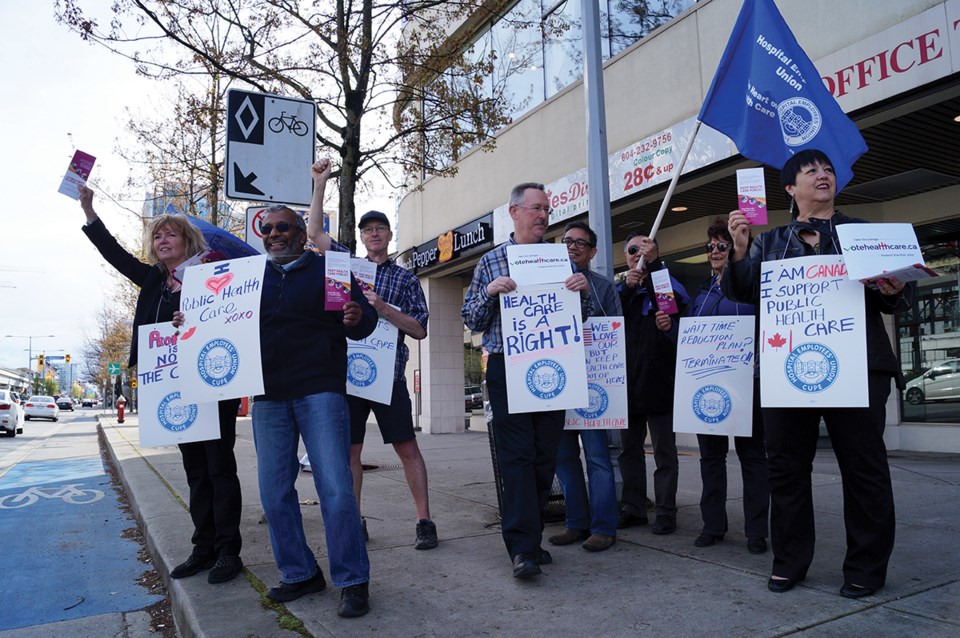A group of public healthcare workers and advocates rallied Tuesday afternoon outside Richmond MP Alice Wong’s office against the federal government’s cancellation of the Canada Health Accord.
The rally was organized by the Hospital Employees’ Union of B.C., which states the province will receive $500 million less in funding each year for the next 10 years.
Health workers claim a $36 billion reduction in funding for provinces across Canada over the next 10 years will undermine the national healthcare system and ignore the country’s need for a national pharmaceutical drug strategy.
At the rally Carolyn Unsworth, vice-president of HEU BC, and a healthcare assistant for 30 years, said the federal government is trying to absolve itself of healthcare responsibilities, which will come with consequences.
“There will be longer waits, less staff and there will be less time given to each patient in our care. The agenda is the government wants us to pay for our own healthcare and take the private room. Rich people will always be able to afford to do that, but this is Canada and you don’t stop the public system to make the private system work,” she said.
“The Accord was working effectively but we needed more money, especially when you look at our ageing population,” she added.
Unsworth said the union is “always open to efficiencies but we cannot change the fact we are ageing.”
She wants the federal government to increase funding for home care, as well.
On Monday, 8,000 doctors across the country signed a petition for a new accord.
Under the Accord (an agreement for national funding and standards set by the federal government for the provinces) the federal government’s Canada Health Transfer payments were set at six per cent growth annually. In 2011 the federal government announced that when the Accord expires, such payments would grow according to a three-year average of gross domestic product (GDP), with a guarantee of three per cent growth, starting in 2017.
Canada’s GDP average from 2011 to 2013 was 2.1 per cent, according to the World Bank.
In another move the government moved from partially fixing health payments based on a province’s tax revenue to only basing them on population.
The Accord, which was cancelled last year, set forth a number of goals, among them: reducing wait times and setting benchmarks; improving human resource management, including expanding assessment of internationally trained professionals; improving access to home and community care; better information sharing, including improving electronic health records; better healthcare for the North; and, last but not least, a national pharmaceutical strategy, which would include accelerating access to non-patented drugs.
The changes mean a unified, national Medicare policy (let alone the possibility of a Pharmacare plan) could be in jeopardy, according to Unsworth.
The issue is highly politicized and pits those who want to maintain public healthcare against those who want a privatized model introduced.
CUPE (Canadian Union of Public Employees) has stated the Accord did not achieve most of its goals, but only because there was not enough money and set goals from the federal government.
The right-wing think-tank Fraser Institute wrote that the reduced funding is simply a result of opponents using a hypothetical projection of spending that assumes larger annual increases compared to what the federal government has promised until 2024.
While actual dollar amounts will continue to increase, CUPE states the federal government’s share (percentage) of funding from the overall budget will decline.
In 2005 the federal government transferred $20.3 billion to provinces whereas this year it transferred $34 billion.



